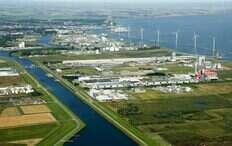- Groningen Seaports allocates a 16-hectare site for biomethanol production near Delfzijl.
- Perpetual Next plans to produce 220,000 tons of biomethanol annually for 75 years.
- FuelEU Maritime regulation mandates a 2% emissions reduction in 2025, rising to 80% by 2050.
- Global methanol demand is expected to exceed 500 million tons per year by 2050.

New Biomethanol Production Site
Groningen Seaports has allocated a 16-hectare waterside location near Delfzijl for biomethanol production. This site will enable the production of 220,000 tons of biomethanol annually, with operations expected to continue for 75 years.
Strategic Importance
The location offers direct access to waterways and a dedicated loading and unloading quay, facilitating international supply and distribution. This site is one of three in the EU where large-scale biomethanol production will occur, supporting the European raw materials transition.
Regulatory Support
The FuelEU Maritime regulation, effective January 1, 2025, promotes renewable and low-carbon fuels in the maritime sector. It mandates a 2% reduction in greenhouse gas emissions in 2025, increasing to 80% by 2050. Biomethanol is recognized as a cost-effective alternative to conventional marine fuels.
Global Methanol Demand
Worldwide methanol demand is approximately 100 million tons per year and is projected to grow to over 500 million tons by 2050. The chemical industry uses methanol to produce resins, adhesives, paints, plastics, and pharmaceuticals. It is also emerging as a key alternative fuel for shipping.
Environmental Impact
Biomethanol is produced from low-grade carbon sources, primarily wood waste, contributing to the circular economy and reducing greenhouse gas emissions. This supports a more sustainable chemical industry and maritime sector.

